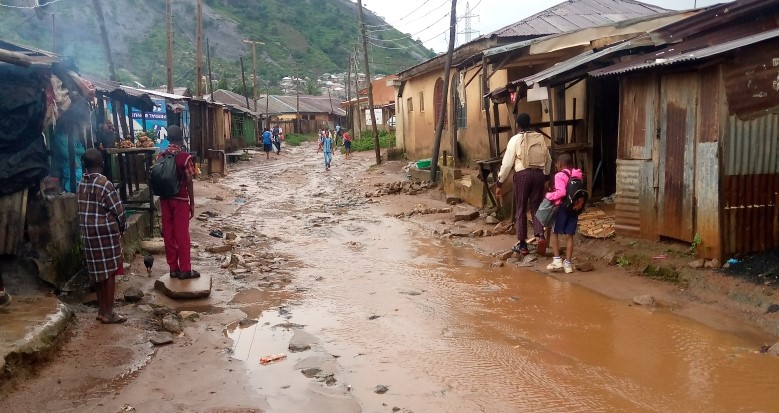Nigeria’s Federal Capital Territory (FCT), residents are lamenting over the unbearable urban poor burden, which they say exposes them to hazardous living conditions as a result of poor sanitation, lack of employment, and personal security.
A situation the residents say is an unbearable urban poor crisis that is creating huge inequality and poverty that is pushing many into crime.
A visit to Dutse Alhaji an informal settlement that is 10 kilometres away from Abuja city centre, shows how the residents are living in a very poor environment that can be best described as squalor with congested housing.
The experience in Bwari is not different from that of Dutse Alhaji as residents were seen living in a terribly dirty environment with a huge infrastructural deficit
In different interviews conducted by MAWA Foundation in the communities, residents revealed how they live in unimaginable poverty with no hope of having a decent living in their homes located a few kilometres away from the Aso-Villa which is Nigeria’s president’s house.
The locals say they lack safe drinking water and are groaning over poor sanitation. They showed dirty gutters that revealed the absence of poor drainage and solid waste collection. A situation they say further complicates hygiene in the area.
Mrs. Ndem Peter, one of the residents who are very angry over the growing urban poor in FCT, told MAWA officials that a major cause of the situation is the lack of housing.
He blamed the situation on the rapid urbanization that is taking place in FCT and the government’s lack of interest in providing low-income housing for the poor.
“Many people are coming into FCT, which is expanding the city capacity and unfortunately, the government is doing nothing to address the city urbanization surge”, Peters told MAWA officials.
Mrs. Caroline Uzoma, a community resident who spoke to MAWA officials at her shop in the Sokale area of Dutse Alhaji, advised the Federal Capital Territory Administration (FCTA) to go into strong city planning that will address the rising urban poor that has become very prominent in Abuja.
A senior staff of the Bwari Area Council who spoke to MAWA officials at the government secretariat and does not want his name mentioned, pointed out that the urban poor is a challenge that must be addressed not only in Abuja but across all the Nigerian cities.
According to him, many communities in Abuja are having the problem of underfunded schools, no housing, poor health sanitation, and an increasing crime rate mainly among the youth. A situation he says happened as an indicator of the urban poor which has taken over the city.
A top government official from the FCTA, who spoke to MAWA but wants his identity concealed, said the urban poor in Abuja is one that should give everybody sleepless nights. According to him, it has a lot of consequences which higher crime rate is one of them.
He suggested that the Nigerian state make a huge investment in addressing the urban poor. And, in doing that, the government must make huge investments in education, health, housing, environmental safety and create employment by making infrastructures available to drive job creation.

